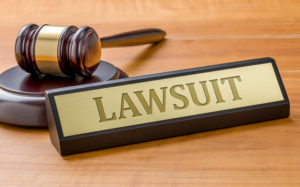When it comes to brain injuries, most people think of concussions. While concussions are among the most common types of brain injuries, many other types can result in serious symptoms. Brain injuries affect people of all ages and are mostly preventable with care and caution while driving, walking, or playing sports. Although most of us are paying attention, the negligence of someone else could be one of the main causes of TBI for you or a loved one. The lasting effects of such an injury change the life of your loved one forever. If this is something that your loved one experienced, consider discussing their case with a brain injury lawyer.
4 Common Types of Brain Injuries
 The human brain is the most complex organ in the body. A TBI diagnosis of a brain injury can mean a variety of different things—even cases of whiplash can interrupt normal brain function. When it comes to types of brain injuries, there are two main categories:
The human brain is the most complex organ in the body. A TBI diagnosis of a brain injury can mean a variety of different things—even cases of whiplash can interrupt normal brain function. When it comes to types of brain injuries, there are two main categories:
- Traumatic brain injury (TBI) – The Centers for Disease Control (CDC) defines a TBI as a bump, blow, jolt, or other external force to the head that disrupts normal brain function. TBI is a serious health problem in the United States that accounts for millions of hospitalizations and deaths each year. Permanent disability is a potential outcome for TBI patients.
- Acquired brain injury (ABI) – This type of brain injury is the result of an internal force or complication that disrupts normal brain function. An ABI occurs at a cellular level in the brain. Electrical shock, a near-drowning, or an airway obstruction that results in limited or no oxygen to the brain are examples of an ABI.
No matter which type of brain injury your loved one experienced, the need for professional medical care is immediate. With proper tests, a medical professional can determine the type of brain injury and how to approach treatment. Common terms related to brain injuries include:
1. Concussion – A bump, jolt, or blow to the head causes the gelatin-like brain to bounce back and forth within the skull, often striking the hard skull and causing injury. The result is often a concussion, although symptoms are sometimes slow to appear. It may not be until hours or days later that they exhibit signs of confusion, memory loss, or dizziness.
The delayed symptoms of a concussion are why it is imperative to seek medical attention immediately after the injury. For patients with previous concussions, the cumulative effects can cause long term issues with memory, concentration, and depression.
2.Second impact syndrome – A diagnosis of second impact syndrome means the patient experienced a second head injury before the healing of a previous head injury. A study of 94 catastrophic head injuries of high school and college football players found that 71 percent of the high school players experienced a previous concussion earlier in the same season. An incredible 39 percent continued playing while still experiencing the residual effects of their first concussion.
3.Diffuse axonal injury – This type of injury occurs when a trauma causes injury at a microscopic level in multiple areas of the brain. Specifically, this results in long brain fibers—called axons—shearing due to trauma from a traumatic event, like that of a car crash. A diffuse axonal injury causes changes in the brain that are so tiny, they usually cannot be detected on MRI or CT scans. Depending on the locations of the injury to the axons, different functions in the brain may be affected. If the injury to axons occurs in only one specific location, this is referred to as a focal axonal injury rather than a diffuse axonal injury.
4.Penetrating head injury – When an object penetrates the skull and reaches the brain, it is extremely serious and often deadly. Patients who experience such a devastating brain injury and survive likely face a lifetime of rehabilitation, with little chance of a full return to normalcy.
A brain injury can happen in a second yet have an impact that lasts a lifetime. A commute to work, a night shopping with friends, or a high school football game can result in an unexpected crash, fall, or collision that causes permanent brain damage.
Any type of head injury is serious and demands medical attention. When another person is responsible for how the injury occurred, consult with a brain injury attorney to discuss your options. No one should pay out-of-pocket medical expenses due to a preventable accident.
Brain Injuries and the Impacts on Your Life
The full impact of a brain injury isn’t known right away. Until you learn the extent of damage, how permanent the damage is, and the treatment necessary, you can’t fully comprehend the effect on your family’s life.
The damage to this most important organ can result in one, or more, of the following impairments:
- Cognitive function – When the brain experiences an injury, the cognitive function is often disrupted. This means the patient experiences difficulty with concentration and memory. Your loved one who was once good at remembering birthdays now needs to relearn how to dress and brush their teeth, for example.
- Motor function – The brain serves an important role in coordinating muscle movement and motor function. Your loved one’s ability to move and function may diminish due to weakness in the extremities or poor balance. In some cases, patients with severe brain injury may never walk again. These patients may remain confined to a bed or a power chair throughout their life.
- Sensation – The brain controls one’s vision, hearing, and touch. When injured, a patient can experience difficulty seeing objects or hearing their favorite music. The sensations of taste and touch can change how they experience and interact with the world.
- Behavior/Psychological – Brain injuries of any type can affect a patient’s behavior and emotions. Before a brain injury, your loved one was the calmest person you ever knew. After the injury, they exhibit sudden bursts of anger or aggression. Their typically happy-go-lucky personality is now prone to bouts of depression. Some of the more common results of brain injury are anxiety and depression.
The changes brain injuries bring upon you and your loved one are immense. Life is never the same for anyone, including spouses, siblings, and children. Friends may shy away simply because they don’t know what to say or do. Seeking the support of other families in the same situation or by joining brain injury support groups can help you feel not so alone.
There is no excuse for the two actions listed below:
Car crashes – Including drunk driving, distracted driving, sleepy truck drivers, or speeding drivers
Premises liability – The law expects property owners to practice reasonable care to keep the property safe when inviting others to visit. This applies to both your next-door neighbor or your favorite downtown restaurant. Examples of premises liability where a brain injury is possible are:
- Failure to replace a broken lightbulb in the parking lot, resulting in a fall at night.
- No handrail along stair steps is another example of where a fall can occur, resulting in a head injury.
- An invitation to a neighborhood cookout can result in a child nearly drowning in an unfenced pool. The lack of oxygen to the brain can result in ABI from which the child may never recover.
TBI and ABI are devastating injuries. When such an injury occurs due to the reckless actions of another person, there is a way to pursue justice.
The medical expenses can easily reach into the millions of dollars each year. Medical costs only increase over time, resulting in financial stress for you and your family. If your spouse was a significant provider for the family and is now unable to work, you deserve help. Patience is important due to the complex nature of brain injury cases. An experienced California brain injury attorney knows that if an insurance company won’t settle out-of-court, then going to trial is the only option.
Securing legal representation that fights for fair compensation for your loved one is important for several reasons. It provides you with peace of mind that someone is looking out for your loved one’s best interests. It can provide financial compensation for your loved one’s future medical care. And most importantly, it holds those responsible accountable for their actions.
Brain Injury Resulting in Death
A brain injury is sometimes so serious, it results in immediate death. Some types of brain injuries may result in a patient living months or years with the injury, only to succumb to it later. When your loved one experiences a brain injury that results in death, you may be entitled to a wrongful death claim. If the injury is the result of the careless actions of another person, consult with a wrongful death lawyer without delay.
Each case is different, however, you may be entitled to compensation for:
- Funeral expenses
- Medical bills
- Loss of income
- Loss of companionship
During a time of enormous grief, it is impossible to deal with all of the details involving your case. By securing the services of a highly skilled lawyer, you can focus on your family. While no amount of compensation will ever replace a loved one, pursuing litigation against the responsible party could ease your financial stress.
How a Brain Injury Attorney Can Help
When a loved one experiences a serious brain injury, they are often unable to pursue justice for themselves. They may have trouble communicating, and difficulty understanding their situation. It is during this stressful time that you must advocate for justice for your loved one.
It is difficult enough to see them in such a traumatic state. The charming and witty person you once knew is now replaced with someone who must relearn basic skills. Once the shock of what happened passes, the reality of the situation demands accountability.
In the days and weeks following your loved one’s accident, aggressive insurance company representatives may contact you. These representatives tend to initiate contact to make a settlement offer. It is important to keep in mind during this overwhelming and upsetting time that the insurance companies are not looking out for your loved one. Their primary goal is to protect the best interests of the company.
A large settlement offer from the insurance company is tempting yet typically not enough to cover any future medical needs. Securing someone to protect the best interests of your loved one is crucial. It is a wise decision to decline to speak with the representatives and to consult with a brain injury lawyer instead.
Balancing visits with your loved one while maintaining your home is exhausting for even the most energetic people. If your loved one is in a hospital or skilled living facility far away, the situation is even more tiring and stressful. This is no time for you to deal with insurance company representatives or any details involving your loved one’s case.

Brain injury cases are quite complex. Navigating the California court system and insurance negotiations is best left to a legal professional. Personal injury lawyers experienced in brain injury cases treat their clients with compassion and respect. They pursue the best compensation possible for your loved one. Serving as your loved one’s advocate is necessary when they are unable to represent themselves. Their brain injury, at the fault of another person, isn’t fair, and they deserve the best care possible. Don’t try to handle the case alone. Brain injury cases require experience and legal knowledge that is beyond the skills of most people.
Remaining strong during this difficult time isn’t easy. By gathering important documents and contacting a brain injury attorney from the Gomez Firm, you’ll feel more confident about possibly obtaining justice. You have nothing to lose by scheduling a free case evaluation and much to gain should your case result in success. Taking the first step sets the wheels in motion toward a civil action on behalf of your loved one. No matter what type of brain injury they experienced, take courage and discuss their case with a brain injury attorney today.







